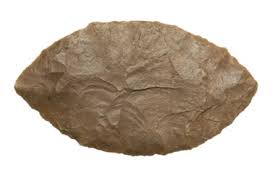记忆方法
记住“flint”可以通过联想其形状和特性。想象一个“F”字母像一块尖锐的燧石(flint),能够引发火花或点击声音。这种联想有助于记住“flint”这个词是指燧石。
以上内容由AI生成, 仅供参考和借鉴
中文词源
flint 火石,燧石
来自PIE*splei,撕开,分开,词源同split, splinter. 指古代用来打火用的两块硬石片。类似词义演变比较vagina, vanilla. 拼写演变比较foam, spume.
英语词源
- flint (n.)
- Old English flint "flint; a type of rock noted for hardness and for giving off sparks when struck," common Germanic (cognates Middle Dutch vlint, Old High German flins, Danish flint), from PIE *splind- "to split, cleave," from root *(s)plei- "to splice, split" (cognates: Greek plinthos "brick, tile," Old Irish slind "brick"), perhaps a variant of *spel- (1) "to split, break off." Transferred senses (hardness, etc.) were in Old English.
权威例句
- 1. Under the pressure, the flint crumbled into fragments.
- 燧石在压力的作用下碎成了小块。
- 2. His eyes were as hard as flint.
- 他的眼神冷酷无情。
- 3. Houses in this part of the country are built of flint.
- 这个国家这一区的房子是用燧石建造的.
- 4. The rock here was as hard as flint.
- 这里的岩石像燧石一样坚硬.
- 5. He has a heart as hard as flint.
- 他有一副铁石心肠.

